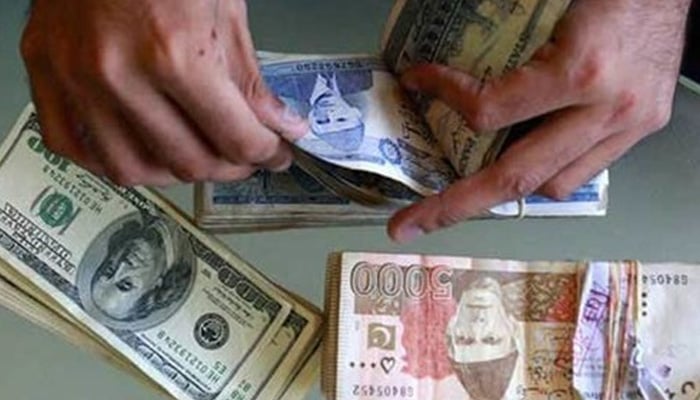Currency depreciation to lure back foreign investors
KARACHI: Rupee devaluation is likely to lure back foreign investors who have been pulling out from the stock market for quite some time and it is to give much-needed impetus to textile and power companies, analysts said.
Analyst Umair Naseer at Topline Securities said foreigners have been net sellers of $266 million in the current fiscal year to date versus $728 million in the corresponding period last year. Foreigners have been net sellers in the market since 2015.
Rupee fell 3.8 percent against the US dollar to close at 119.25 in the interbank market. The local currency reached Rs122, down 4.6 percent in early hours of trading.
Naseer said foreign selling could be attributed to outflows from emerging markets and deterioration in economic indicators.
Emerging markets are continually seeing foreign outflows as US bond yields continued to push up. Foreigners had dumped a combined $12.3 billion of bonds and stocks in emerging market assets, according to the Institute of International Finance.
Analysts said rupee fall bodes well for the external account and stock markets. Major beneficiaries are expected to be companies from exploration and production, independent power producers, textile, banks and chemical sectors. Yet, it might prove negative for auto and cement sectors.
Abdul Azeem, head of Research at Spectrum Securities said the devaluation of currency is positive for exploration and production sector since its revenue is linked to dollar.
Likewise, it is also positive for independent power producers due to their return on equity’s indexation in USD.
Revenue and margins of export-oriented textile and IT sectors might also increase as a consequence of rupee decline.
Rupee devaluation is, however, negative for auto and cement sectors to some extent as a rise in the cost of imported raw materials would affect their profitability and they ought to pass on high cost of production to consumers.
“We don’t see any major impact on oil market companies, refineries, and fertiliser makers, although oil marketing companies and refineries might face one-off exchange losses this year,” Azeem added.
Zeeshan Afzal, head of Research at Insight Securities said currency devaluation is usually perceived as negative, indicating economic problems with the country.
“In Pakistan’s case where the central bank is supervising the currency movement every day, it is actually necessary, and indicates that policymakers are serious to correct the economic problems,” Afzal said.
“For stock market, moderate currency depreciation, as long as it does not derail the whole economic cycle, is positive as most of the sectors are positively linked with devaluation while many are capable of increasing the prices to pass on higher import cost.”
-
 Paul Anka Reveals How He Raised Son Ethan Differently From His Daughters
Paul Anka Reveals How He Raised Son Ethan Differently From His Daughters -
 'A Very Special Visitor' Meets Queen Camilla At Clarence House
'A Very Special Visitor' Meets Queen Camilla At Clarence House -
 Jodie Turner Smith Shares One Strict Rule She Follows As A Mom
Jodie Turner Smith Shares One Strict Rule She Follows As A Mom -
 Hailey Bieber Reveals KEY To Balancing Motherhood With Career
Hailey Bieber Reveals KEY To Balancing Motherhood With Career -
 Photo Of Jay-Z, Other Prominent Figures With Jeffrey Epstein Proven To Be Fake
Photo Of Jay-Z, Other Prominent Figures With Jeffrey Epstein Proven To Be Fake -
 Hillary Clinton's Munich Train Video Sparks Conspiracy Theories
Hillary Clinton's Munich Train Video Sparks Conspiracy Theories -
 Fans Slam Talk Show Host For 'cringe' Behavior In Chris Hemsworth Interview
Fans Slam Talk Show Host For 'cringe' Behavior In Chris Hemsworth Interview -
 Woman Jailed Over False 'crime In Space' Claim Against NASA Astronaut
Woman Jailed Over False 'crime In Space' Claim Against NASA Astronaut -
 James Van Der Beek’s Close Pal Reveals Family's Dire Need Of Donations
James Van Der Beek’s Close Pal Reveals Family's Dire Need Of Donations -
 Prince William And Harry's Cousins Attend 'Wuthering Heights' Event
Prince William And Harry's Cousins Attend 'Wuthering Heights' Event -
 Hailey Bieber Turns Heads Just Hours After Major Business Win
Hailey Bieber Turns Heads Just Hours After Major Business Win -
 King Charles' Andrew Decision Labelled 'long Overdue'
King Charles' Andrew Decision Labelled 'long Overdue' -
 Timothee Chalamet 'forever Indebted' To Fan Over Kind Gesture
Timothee Chalamet 'forever Indebted' To Fan Over Kind Gesture -
 Columbia University Sacks Staff Over Epstein Partner's ‘backdoor’ Admission
Columbia University Sacks Staff Over Epstein Partner's ‘backdoor’ Admission -
 Ozzy Osbourne's Family Struggles Behind Closed Doors
Ozzy Osbourne's Family Struggles Behind Closed Doors -
 Dua Lipa Claims Long-distance Relationship 'never Stops Being Hard'
Dua Lipa Claims Long-distance Relationship 'never Stops Being Hard'




